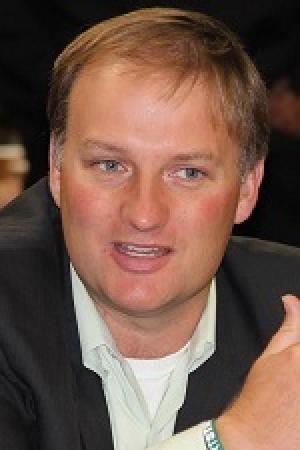People
Mark Vagle
-
Pronouns: he, him, his
-
Professor
My research, teaching, and service are intentionally linked as I study, teach, and lead efforts designed to critically examine some of the broad social and philosophical concerns that take concrete (lived) shape in the curriculum and pedagogies of…
PhD, Elementary Education, University of Minnesota
MA, Education, St. Mary’s University
BA, Elementary Education, Concordia College
Elementary Education, Phenomenology, Social Class, Curriculum Studies, Critical Theories, Philosophies of Education, Qualitative Research
My research, teaching, and service are intentionally linked as I study, teach, and lead efforts designed to critically examine some of the broad social and philosophical concerns that take concrete (lived) shape in the curriculum and pedagogies of elementary education—a field that I envision as a fluid intellectual space in which the more particularized fields of early childhood education (Birth-8 years) and middle grades education (10-14 years) can be put in dynamic dialogue with one another; developmental stage discourses can be considered and troubled, and commitments to multidisciplinary curricula and pedagogies can be continually re-imagined. To this end, I use phenomenological research methods to empirically examine some of the ongoing, dynamic tensions between social/philosophical concerns and technical aspects of how the curriculum is enacted in classroom teaching; theorize these tensions using phenomenological and critically oriented philosophies and theories; and engage my students in the never-ending process of interrogating their (our) assumptions given these tensions.
The CLASSroom Project
In some of my recent research on classroom-based formative assessment in high-poverty school contexts, I have become acutely aware of the profound influence social class has on the ways in which teachers and students perceive (and engage with) one another, how particular pedagogies are enacted, and what learnings are made possible in these relations. Informed by this issue, a colleague and I have launched The CLASSroom Project, which centers on what we have termed social class-sensitive pedagogies designed to meet the needs of working-class and poor students and their families as they navigate schools steeped in middle-classed assumptions of normality.
Over the past 2 years, we have worked with over 1000 educators in our professional development workshops and consultations and have written two journal articles--one at Curriculum Inquiry and a second forthcoming. Currently, I am working with a group of elementary school teachers as they learn to create social class-sensitive photo stories, and in turn use social class-sensitive photo stories to establish deeper, more meaningful connections with their students, particularly with those who come from poor and working-class backgrounds.
Awards
- Marty & Jack Rossmann Award
- for exceptional level of creativity and productivity in scholarship, teaching, and service, University of Minnesota, 2017
- Outstanding Qualitative Research Book Award
- AERA Qualitative Research SIG, 2016
- Early Career Award Finalist
- AERA Division G, 2016
- College of Education Faculty Senate D. Keith Osborn Award for Teaching Excellence: Assistant Professor Category, The University of Georgia, 2010
- Outstanding Mentoring Award Nominee, The University of Georgia, 2010
Associations/Memberships
- AERA
- Literacy Research Association
Sponsored Projects
Alternative Pathways to Teaching: Examining Equity-Based Teacher Education Jan 1, 2015 - Dec 31, 2017
Sponsored by the Bush Foundation
BAM Adventures Study, August 2012-February 2013
Sponsored by the Association of the United States Army (AUSA)
Minnesota Reads: A Higher Education Partnership to Better Prepare Faculty and Future Teachers for Reading Instruction, 2002-2007
Sponsored by the Bush Foundation
Journal Articles
Jones, S. & Vagle, M. D. (2013). Living contradictions and working for change: Toward a theory of social class-sensitive pedagogy. Educational Researcher, 42(3), 129-141.
Freeman, M. & Vagle, M. D. (2013). Grafting the intentional relation of hermeneutics and phenomenology in linguisticality. Qualitative Inquiry, 19(9), 725-735.
Vagle, M. D. & Jones, S. (2012). The precarious nature of social class-sensitivity in literacy: A social, autobiographic, and pedagogical project. Curriculum Inquiry, 42(3), 318-339.
Vagle, M. D. (2011) Critically-oriented pedagogical tact: Learning about and through our compulsions as teacher educators. Teaching Education, 22(4), 413-426.
Vagle, M. D. (2011). Lessons in contingent, recursive humility. Journal of Adolescent and Adult Literacy, 54(6), 362-370.
Vagle, M. D. (2010). Re-framing Schön’s call for a phenomenology of practice: A post-intentional approach. Reflective Practice: International and Multidisciplinary Perspectives, 11(3), 393-407.
Vagle, M. D. (2010). Pathic pedagogies as everyday work. Pedagogies: An International Journal, 5(2), 142-152.
Vagle, M. D. (2009). Validity as intended: “Bursting forth toward” bridling in phenomenological research. International Journal of Qualitative Studies in Education, 22(5), 585-605.
Vagle, M. D. (2009). Locating and exploring teacher perception in the reflective thinking process. Teachers and Teaching: Theory and Practice, 15(5), 579-599.
Books
Vagle, M. D. (2014). Crafting Phenomenological Research. Thousand Oaks, CA: Left Coast Press.
Vagle, M. D. (Principal Author and Editor) (2012) Not a stage! A critical re-conception of young adolescent education. New York: Peter Lang Publishing.
Lee, K. & Vagle, M. D. (Eds.) (2010) Developmentalism in early childhood and middle grades education: Critical conversations on readiness and responsiveness. New York: Palgrave Macmillan. [re-released in paperback, 2012]

-
Curriculum and Instruction
125 Peik Hall
159 Pillsbury Drive SE
Minneapolis, MN 55455 - mvagle@umn.edu
-
By Appointment